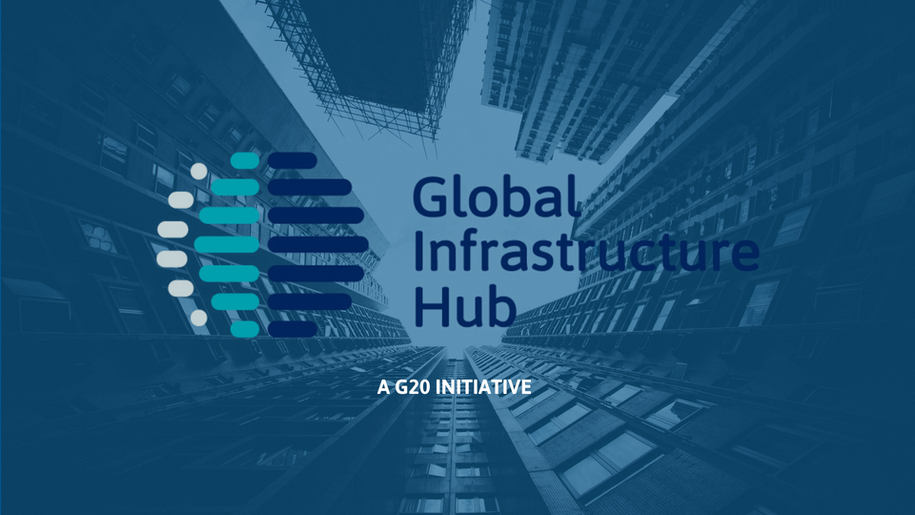749 results found
Featured results



More results
On 22 July, at their meeting in Buenos Aries, the G20 Finance Ministers and Central Bank Governors voted to renew the mandate of the Global Infrastructure Hub for another four years.
The Global Infrastructure Hub and Turner & Townsend Launch PPP Contract Management Tool. Effective management essential to unlocking value behind infrastructure PPPs.
This book addresses two concerns. First that advanced technologies developed in high-income countries would inexorably lead to job losses of lower-skilled, less well-off workers and exacerbate inequality. Second Policies intended to protect jobs from technology advancement would themselves stultify progress and depress productivity, these are addressed using the output effect subsitution effect framework.

On 12 July 2018 the GI Hub’s COO, Mark Moseley, joined a webinar panel on blockchain and its applications for infrastructure, hosted by the International Project Finance Association (IPFA). Blockchain is the technology that underpins Bitcoin and other similar ‘cryptoassets’, such as Ethereum and Ripple. Its potential, and the recent volatility of cryptoassets, has made the technology one of the most hyped and misunderstood technologies in the market.
Infrastructure can often be used as a pawn in the political chess game, not only at a federal level between political parties, but at a foreign policy level too. It’s crucial that a cross-border infrastructure project has political support and cooperation from all parties involved, and that it’s being supported not for political gain, but to further regional development. A lack of strong political leadership can be detrimental to a cross-border project, and weak capacity can be a deterrent to investors.
The Africa Infrastructure Fellowship Program (AIFP)—a joint initiative between the Global Infrastructure Hub (a G20 initiative), private investment firm Meridiam, and the World Economic Forum (WEF)— has been formally announced by Mr Jean-Baptiste Lemoyne, the Secretary of State attached to the Minister for Europe and Foreign Affairs.

The PPP Contract Management Tool provides practical guidance to government officials responsible for managing public-private partnership (PPP) contracts and concession contracts during construction and operations, based on extensive data and real-life case studies.


On 3-4 July 2018 the GI Hub gave a series of presentations at the International PPP Finance Summit, held in London.
The Global Infrastructure Hub, a G20 initiative, has today published two reports that reveal an urgent need for infrastructure investment in 10 Compact with Africa[1] countries, and highlight the reforms required to encourage greater investment.
A new report released today by the Global Infrastructure Hub, a G20 initiative, has revealed an infrastructure investment gap of US$1 trillion in 10 Compact with Africa[1] countries over the next 22 years. This represents a 42 per cent investment gap; one of the largest regional gaps in the world.
The participants of the second Regional Roundtable on Infrastructure Governance held in Côte D’Ivoire last week reinforced the need for good governance across all stages of infrastructure delivery. The Regional Roundtable was the second of its kind, with the first held in South Africa in November 2017.
When we as consumers decide to invest our money—whether through shares, bonds, or other instruments—we look at whether our investment will deliver a solid financial return. It makes sense then that the same risk-return principle is applied to investments in infrastructure.
This brief illustrates the rationale, methodology and results of the African Infrastructure Development Index.

This study looks at the project practice in light of the strategy as declared in the sector paper. The main focus is on the first decade of the urban transport lending program (1972–82).

Capital planning guidelines provide guidance on how infrastructure programs and project proposals should be planned, appraised and evaluated before significant funds are committed.

The PPP manual provides an overview of the procedures to be followed and approvals required for implementation of a PPP project.

In the world of infrastructure, technological change presents both a challenge and an opportunity. The challenge arises because of the large capital investments which infrastructure projects normally require and the threat that the infrastructure may become obsolete before the investors – whether they are public or private investors – can fully recover their costs. At the same time, there is an opportunity, namely that by using new technologies, we can deliver infrastructure services to the public in a way that is both more efficient and more effectiv





 G20 Communique 22.07.18
G20 Communique 22.07.18














